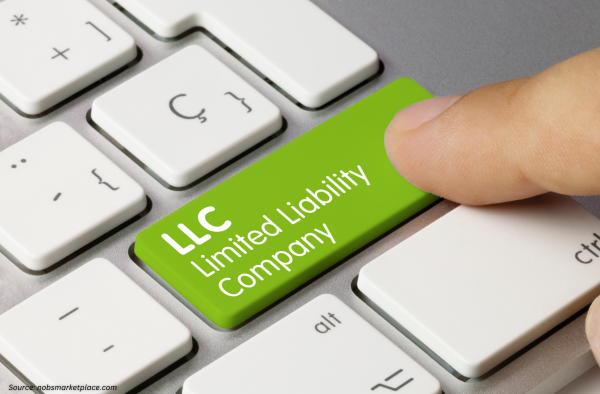Starting a Limited Liability Company (LLC) in the United States is a popular choice for entrepreneurs looking to establish a business presence. An LLC combines the liability protection of a corporation with the tax benefits and flexibility of a partnership. This structure is particularly appealing to small business owners and international entrepreneurs. Forming a limited liability company varies slightly from state to state, but the general steps are similar across the country.
This article explores how to start an LLC business in the USA.
Understanding The Basics Of An LLC
Before diving into the specifics of forming an LLC, it’s crucial to understand what this business structure is and how it operates. An LLC is a business structure allowed by state statute. The owners, also called members, can include individuals, other LLCs, corporations, and foreign entities. One of the primary advantages of this business entity is that it offers personal liability protection to its members, meaning personal assets are generally protected from business debts and lawsuits.
Steps For Setting Up An LLC Business In USA
Now that you understand the basics of an LLC, it’s time to familiarize yourself with the steps for establishing one in the United States of America. These include:
- Choose A State For Your LLC
The first step in starting an LLC is deciding which state to establish it. This decision can be influenced by several factors, including the location of your primary market, the state’s tax structure, and the cost of formation and ongoing compliance. For instance, Delaware and Nevada are known for their business-friendly environments, making them popular choices among non-residents.
The selection of a name for your LLC is a critical step. The LLC’s name must be unique and distinguishable from other business names in the state. Most states require the inclusion of “LLC,” or “Limited Liability Company” in the business name. Hence, it’s advisable to conduct a thorough search through the state’s business name database and consider a trademark search to ensure your chosen name is available and doesn’t infringe on any existing trademarks.
- Open An LLC Bank Account For Non-Residents
Opening an “LLC bank account non resident” can be challenging but essential in establishing your business’s financial foundation. Generally, non-resident LLC owners may face additional requirements and documentation needs when opening a bank account in the US. These might include an Employer Identification Number (EIN), personal identification, and possibly a physical visit to the bank in the US. The specifics can vary based on the bank’s policies and the state where your limited liability company is formed.
- Assign A Registered Agent
Every LLC must have a registered agent. This is a person or company authorized to receive legal documents on behalf of the limited liability company. The registered agent must have a physical address in the state of incorporation and be available during regular business hours.
- Create An Operating Agreement
Although not required in all states, drafting an operating agreement is highly recommended. This document details the LLC’s ownership, operations, and financial protocols. It serves as a guideline for how the limited liability company will be run and can help prevent member misunderstandings.
- File The Articles Of Organization
The core step in forming an LLC is filing the Articles of Organization (sometimes called a Certificate of Formation or Certificate of Organization) with the state. This document includes basic information about the LLC, such as its name, address, registered agent, and sometimes the names of its members. Additionally, consider the filing fee, which varies by state, when submitting the Articles of Organization.
- Secure An Employer Identification Number (EIN)
An EIN (Federal Tax Identification Number) is essential for tax purposes and distinguishes your business from others. Most banks need an EIN to open a business bank account. Secure your EIN from the Internal Revenue Service (IRS) as it’s necessary for hiring employees, filing taxes, and more.
- Comply With State And Local Regulations
After forming your LLC, it’s essential to understand and comply with any other state and local business requirements. This might include obtaining business licenses or permits, depending on the business type and location. Additionally, some states require LLCs to file an annual report and pay a yearly fee.
- Manage Taxes For Your LLC
LLCs offer flexibility in how they are taxed. They can be treated as a sole proprietorship, partnership, or corporation for tax purposes. Understanding tax implications and requirements is vital for the informed financial management of your LLC.
- Ensure Continual Compliance And Good Standing
Maintaining your LLC requires ongoing attention to ensure it remains in good standing with the state. This includes timely filing of necessary reports and fees, renewing permits and licenses, and keeping up with changes in state laws that may affect your limited liability company.
- Consider Expansion And Growth Considerations
As your LLC grows, consider expanding your business to other states. This process, called foreign qualification, requires registering your LLC in every state where you conduct business. Hence, it’s essential to understand the nuances and regulations of each state to ensure compliance and optimize your business efficiency and potential.
Final Thoughts
Forming an LLC in the USA can be straightforward but requires careful planning and attention to detail. By keeping the steps mentioned above in mind, you can set up your limited liability company successfully. With the right approach and understanding of the requirements, a limited liability company can provide a strong foundation for your business endeavors.
Justin Lavadia is a content producer and editor at Public Spectrum with a diverse writing background spanning various niches and formats. With a wealth of experience, he brings clarity and concise communication to digital content. His expertise lies in crafting engaging content and delivering impactful narratives that resonate with readers.































































